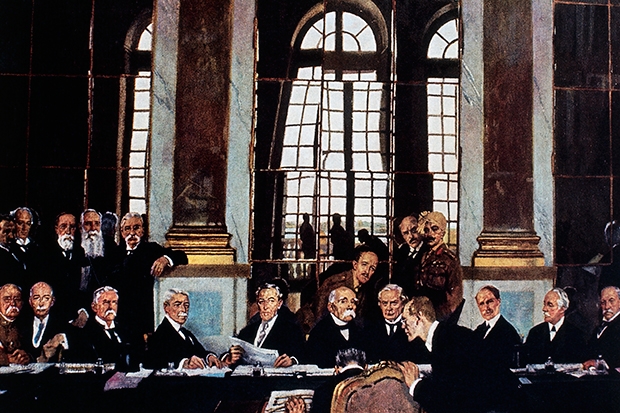In 1919 the economist and sometime prophet John Maynard Keynes left the glittering ballroom of Versailles feeling profoundly despondent. The treaty that determined the political geography of a postwar world inspired in him a fearful sense of inevitability. The punitive conditions imposed on Germany would be too harsh for the country to tolerate for long. One junior delegate in Paris observed: ‘There is not a single person among the younger people here who is not unhappy and disappointed with the terms.’ This was a world not only united by the devastating results of the Spanish ’flu epidemic, responsible for the deaths of five times as many as had lost their lives in the war, but by political and religious fragmentation that was already endemic.
Between the Wars by Philip Ziegler, biographer, historian and scholar, born in 1929, is a fascinating, panoramic overview of the decades that preceded and followed his birth, encapsulating a world balanced precariously on the cusp of peace and conflict. In his self-declaredly idiosyncratic choice of events, domestic and international, political, and social, cultural and scientific, Ziegler begins by describing the alarming responsibility that faced three men, each with their own country’s welfare foremost on their private agenda. In 1919 the French prime minister Georges Clemenceau, the American president Woodrow Wilson and Britain’s David Lloyd George gathered in Paris to sign a misconceived treaty that according to
Ziegler resulted in another world war that ‘might never have occurred’ if this agreement had been ‘drafted with greater realism and foresight’.
In prose of crystalline elegance, Ziegler travels chronologically across countries and continents, discussing global events that range from the complex arguments for Home Rule in Ireland in 1921 to the fascist takeover of Madrid in 1939. He looks at the extraordinary burning of Turkey’s Smyrna in 1922; at Stalin’s power-tricking of Trotsky following Lenin’s sudden death in 1924; at Gandhi’s 1930 sea-walk, demonstrating against the impending threat from a salt tax; at the conflict between Japan and China in 1937; and at the dangers involved in the clash between the indigenous Arabs and the arrival of the itinerant Jews in Palestine in 1938.
World leaders, from Gandhi to Mao Zedong assume a fully rounded presence within the context of the larger story. Ziegler’s chilling accounts of Hitler’s germinating anti-Semitism (supported by a terrifying passage from Mein Kampf about ‘a phenomenon in a long kaftan and wearing black side-locks’) and Hitler’s discovery of his gift for oratory where ‘even the most sophisticated could find themselves overwhelmed by the demagogic passion of his delivery’ demonstrate Ziegler’s gift for transforming the familiar into the arresting.
Not simply a portrait of a world in limbo, of nations and religions fighting for justice and security, here too is evidence of man’s irrepressible appetite for progress and for creativity. The story of the game-changing discovery of penicillin in 1928, and Fleming’s disarming modesty, a man who distilled the tears of his friends to produce the lysozyme that guarded against infection, is full of the detail of humanity.
During the General Strike of 1926, strikers and police abandoned hostilities to play football together in Hyde Park. In 1922 James Joyce, genius, narcissist and freeloader, after receiving a series of rejection slips including one from Mills and Boon, sent George V a copy of Dubliners with ‘an ill-judged appreciation of the monarch’s reading habits’, asking for his help in finding a publisher. And when in 1929 silent movies became voluble there is sympathy for the demise of the heartthrob John Gilbert, a conspicuous casualty of technology ‘whose voice was nothing like as sexy as his profile’.
Ziegler makes no apology for omitting overly discussed domestic issues such as Mosley’s Blackshirts and the Abdication crisis. But the absence of women’s suffrage, women in parliament, women’s cultural role, indeed women anywhere at all except for the occasional walk-on part in a film or a marriage, is puzzling. As political and military intensity reached the climax Keynes warned of in 1939, it was not only ‘the fathers, grandfathers or great-grand-fathers’ but also the women and children of Europe who witnessed a continent in chaos, a life-changing, long-held world dominance exploding in the face of the rising superpower across the Atlantic.






Comments